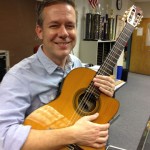 As Matt Gerry pointed out in an earlier post, there are many differing opinions when it comes to teaching TAB. It has been my experience that, when a guitar student arrives in one of my beginning classes knowing how to read a notation system, it is most likely TAB. I have come to realize over the years that the students who arrive knowing how to read ‘a little TAB’ are often the ones who struggle the most when trying to understand traditional staff notation. I think this is because the TAB staff actually looks similar to the traditional staff, and many TAB readers try to understand traditional music notation using the same literal/ visual approach as TAB notation.
As Matt Gerry pointed out in an earlier post, there are many differing opinions when it comes to teaching TAB. It has been my experience that, when a guitar student arrives in one of my beginning classes knowing how to read a notation system, it is most likely TAB. I have come to realize over the years that the students who arrive knowing how to read ‘a little TAB’ are often the ones who struggle the most when trying to understand traditional staff notation. I think this is because the TAB staff actually looks similar to the traditional staff, and many TAB readers try to understand traditional music notation using the same literal/ visual approach as TAB notation.
Over the past few years, I have begun teaching both systems side by side, emphasizing that both are valid ways of writing down and communicating musical ideas, and that each have inherent limitations and advantages. Further, I stress that each are different conceptually, although they look similar. The TAB staff is a ‘picture’ of the guitar neck that tells you where to place your fingers, but does not communicate much musical information; the traditional music staff is a way of indicating precise pitches and rhythmic values, but does not tell you where to put your fingers.
When introducing the pitches on a string, I write out pitch names and show the students what the pitches look like when written out in TAB and what they look like on the staff. I spend a great deal of time having students TAB out melodies written on the staff and vice versa. Here is a sample from a written assessment I gave during the first marking period (I teach bass notes first; the scope of this quiz was natural notes in open position, strings 6-4):
After filling in the missing tab, staff notation and note names, play the following exercises:
Many teachers view TAB as a crutch; but I have come to embrace the other side of the argument- if a student can sit down and ‘TAB out” a melody written in staff notation they are, in essence, reading music; albeit slowly. While there are disadvantages to my approach, I find far fewer students claiming that they ‘can’t read notes.’